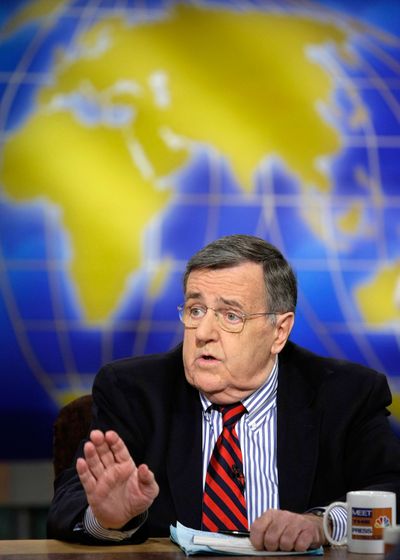Mark Shields, columnist and TV political commentator, dies at 85

Mark Shields, a onetime campaign manager who became one of Washington’s most respected political commentators, both as a syndicated columnist and as a genial liberal counterpart to several conservative sparring partners on PBS NewsHour, died Saturday at his home in Chevy Chase, Maryland. He was 85.
The cause was kidney disease, said his daughter, Amy Doyle.
Shields spent more than a decade working on Capitol Hill and managing Democratic political campaigns before turning to commentary in 1979, when he joined the editorial board of the Washington Post. He soon became a nationally syndicated columnist and a regular presence on television panel shows, eventually spending 33 years as a commentator for what is now PBS NewsHour.
The Wall Street Journal once called Shields one of the “wittiest political journalists in America.”
He was, by his own admission, a traditional Massachusetts liberal in the mold of one of his political heroes, Sen. Robert F. Kennedy, D-N.Y.. He helped organize Kennedy’s 1968 presidential campaign, which was gaining momentum before Kennedy was assassinated in Los Angeles in June 1968.
Thereafter, Shields tended to view politics with a touch of sorrow-filled regret. He often mused that if Kennedy had been elected he would have become the most inspiring and transformative president in a generation. Instead, Shields was left to measure the aspirations and achievements of later generations of political figures, typically couching his views with bemused sense of humor, brushed with the disappointment of reality.
Despite his liberal leanings, he was among the first pundits to predict Ronald Reagan’s runaway victory over incumbent President Jimmy Carter in 1980.
At different times in his career, Shields was paired with conservative commentators Robert Novak, David Gergen, Paul Gigot and, for more than 20 years, New York Times columnist David Brooks. Shields interviewed Republican and Democratic lawmakers on the air and, in an increasingly rare display of bipartisan camaraderie, remained on friendly terms with nearly all of them, even after sometimes heated political disagreements.
In 2012, he and Brooks received a first-ever award for “civility in public life,” presented by Allegheny College. Accepting the honor, Shields said his evenhanded approach was fostered at “NewsHour,” first by hosts Robert MacNeil and Jim Lehrer and later Judy Woodruff.
He said he sought to remember that “in every discussion that the person on the other side probably loves their country as much as you love our country; that they care about their children’s and grandchildren’s future as much as you do; that they treasure the truth as much as you do; and that you don’t demonize somebody on the other side.”